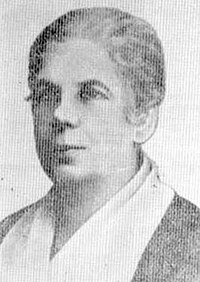
Back إيزابيلا سادوفينو إيفان Arabic ايزابيلا سادوفينو ايفان ARZ Ιζαμπέλα Σαντοβεάνου-Έβαν Greek იზაბელა სადოვიანუ-ევანი Georgian Izabela Sadoveanu-Evan Polish Izabela Sadoveanu-Evan Romanian Ізабела Садовеану-Еван Ukrainian
Izabela Sadoveanu-Evan Isabella Sadoveanu, Izabela Morțun, Izabela Sadoveanu-Andrei | |
|---|---|
 | |
| Born | February 24, 1870 probably in Săucești, Bacău County, Romania |
| Died | August 6, 1941 (aged 71) |
| Pen name | I.Z.S.D., Iz. Sd. |
| Occupation | literary critic, journalist, poet, schoolteacher, educationist, activist |
| Period | 1890–1939 |
| Genre | essay, lyric poetry |
| Literary movement | Poporanism, Impressionism, Viața Românească |
Izabela Sadoveanu-Evan (Romanian pronunciation: [izaˈbela sadoˈve̯anu ˈevan], last name also Sadoveanu-Andrei, first name also Isabella or Izabella; born Izabela Morțun, pen names I.Z.S.D. and Iz. Sd.;[1] February 24, 1870 – August 6, 1941) was a Romanian literary critic, educationist, opinion journalist, poet and feminist militant. She spent her youth advocating socialism, and rallied with left-wing politics for the remainder of her life, primarily as a representative of Poporanist circles and personal friend of culture critic Garabet Ibrăileanu. Under Ibrăileanu's guidance, Sadoveanu wrote for Viața Românească review, where she tried to reconcile ethnic nationalism and traditionalism with aestheticism. As literary critic, she championed the recognition of Symbolism as an independent cultural phenomenon, and reviewed modern developments in English literature.
Sadoveanu represented Romanian feminism at International Alliance of Women congresses, but took a gradualist approach to women's suffrage, and, during the interwar, became interested in creating links between feminism and eugenics. With her activities as schoolteacher and militant, she supported education reform, and qualified to propagate the Montessori method. Late in life, she added feminist anti-fascism to her list of political and social involvements.
The cousin of socialist politico Vasile Morțun, Izabela was the sister-in-law of novelist and political figure Mihail Sadoveanu. She was also related to various families of importance in Romanian political history.
- ^ (in Romanian) "Virginia Woolf în cultura română - bibliografie" Archived 2016-10-19 at the Wayback Machine, in the National Library of Romania Revista Bibliotecii Naționale, Nr. 2/2003, p.36-37